Burkina Faso
Burkina Faso literally “Country of honest Men”, also called Burkina, formerly republic of Upper Volta, is a country in West Africa without access to the sea. It is surrounded by: Mali to the north-west, Niger to the northeast, Benin to the southeast, Togo to the southeast, Ghana to the south, and Côte d’Ivoire to the southwest. The capital Ouagadougou is located in the center of the country. Burkina Faso is a member of the African Union (AU), the Economic Community of West African States (ECOWAS), the Organization for the Harmonization of Business Law in Africa (OHADA) and the ‘Organization of Islamic Cooperation. It is one of the ten least developed countries in the world, with a human development index of 0.402 in 2015.
Burkina Faso’s history
Prehistoric period
As for all of West Africa, Burkina Faso experienced very early settlement, with hunter-gatherers in the northwest part of the country (12,000 to 5,000 years before the Christian era), and tools (scrapers, chisels and points) were discovered in 1973. Sedentarization appeared between 3,600 and 2,600 before the Christian era with farmers, whose traces of construction suggested a relatively permanent installation. The use of iron, ceramic and polished stone developed between 1,500 and 1,000 before the Christian era, as well as the appearance of spiritual concerns, as evidenced by the burial remains discovered. Vestiges attributed to the Dogons have been discovered in the Center-North, North and North-West region. However, they left the sector between the fifteenth century and the sixteenth century to settle in the cliff of Bandiagara. In addition, remains of walls are located in the southwest of Burkina Faso (as well as in Ivory Coast), but their builders have so far been unable to be identified with certainty. The ruins of Loropéni, located near the borders of Côte d’Ivoire and Ghana, are today recognized as a World Heritage Site.
Burkina Faso’s politics
The Constitution of June 2, 1991, adopted by referendum, established a semi-presidential two-chamber regime open to multiparty politics: the president of Faso “(Faso” replaces the word “republic”), elected by the people for five years in a two-round ballot. He should only be able to be re-elected once; the National Assembly is the only legislative body in the country. It can be dissolved by the President of Burkina Faso; the house of representatives which had an advisory role was renewed every three years and was dissolved on January 23, 2002. But the constitutional revision of June 11, 2012 reintroduced a second room, the Senate, which is not yet functional. It should be noted that since its adoption on June 2, 1992, the constitution of Burkina Faso was revised three times respectively in January 1997 to lift the lock on the limitation of the presidential mandate, April 2000 to not only reduce the duration of the presidential mandate of 7 to 5 years and also to re-introduce its limitation to renewable once, January 2002. There is also a constitutional council made up of ten members and an economic and social council whose role is purely advisory.
Burkina Faso’s economy
Burkina Faso is a developing country, where agriculture accounts for 32% of gross domestic product and employs 80% of the working population. It is mainly livestock but also, especially in the south and southwest, crops of sorghum, millet, corn, peanuts, rice. It was the second African cotton producer behind Egypt, despite the aridity of the soils. The cotton sector, in many producing countries has gained strength, with excellent harvests, even if on the world market, the price of a pound of fiber in 2015 was around 0.70 dollar, relatively low compared to the peak from the 2 dollars per pound it had reached in 2011. The country was in first place among the top seven African cotton producers in the mid-2010s. In 2015, almost 100,000 farmers practiced organic farming.
In 2017, Burkina Faso was ranked 146th by the Doing business program in terms of business and is the 134th country where life is best (2017). Burkina Faso has a very large diaspora: for example, three million Burkinabè live in Ghana, three million also live in Côte d’Ivoire and 1.5 million in Sudan. According to the central bank of West African states, these migrants repatriate tens of billions of CFA francs each year to Burkina Faso. Since the expulsions from Ghana in 1967, this situation has also caused tensions with the host countries. The last crisis dates back to the events of 2003 in Côte d’Ivoire, which resulted in the punctual return of 300,000 migrants. A third of the country’s population lives below the poverty line. It should also be mentioned some mining productions: copper, iron, zinc and especially gold (the country has just opened its fifth mine). In the late 1990s, Canadian “junior companies”, invested in more than 8,000 mining properties, in more than 100 countries, most of which were still in the planning stage, multiplied contracts with African countries. In Burkina, they are called Axmin, Orezone Resources, Goldcrest Resources or Etruscan Resources, and are often present in neighboring countries because Burkina is a geological extension of the rich gold zone of Ghana. Burkina Faso is a member of the West African Economic and Monetary Union and the Liptako-Gourma Authority, which is responsible for preventing food crises and droughts through the cooperation of each member country.
Some economic data: GDP: $ 10.678 billion in 201579; GDP per capita: $ 640 in 2015; GDP in purchasing power parity (PPP): $ 1,185 (2007, Quebec, Institut de la Statistique); Real growth rate: 5.2% in 2016; Inflation rate (consumer price index): 6.40% (2006); Exports: $ 1.591 billion in 2011; Imports: $ 2.25 billion in 2011. Human Development Index (HDI) in 2012: 183rd out of 187 countries classified.
Burkina Faso’s demography
Population: 19,512,533 inhabitants (in 2016). 0-14 years: 45.04%; 15-64 years: 52.52%; + 65 years: 2.44% Density: 71.16 inhabitants / km2 Pop growth rate. : 3.01% (in 2016) Migration rate: – 0.97 ‰ (in 2001).
Burkina Faso’s education
Illiteracy is the majority in Burkina Faso. It is more common among women. The majority of students are boys. According to law 13-2007 / AN on the education orientation law, the Burkinabé education system is structured as follows:
Basic education
It includes formal basic education and non-formal basic education. It is compulsory for all children from 6 to 13 years old. Formal basic education has three levels : the first level is preschool education from 3 to 6 years old. This level has three sections. The small section for children from three to four years old, the medium section for those from four to five years old and the large section for those from 5 to 6 years old; the second level is primary education from 6 to 12 years old. It is sanctioned by the Certificate of Primary Studies (CEP). The primary school enrollment rate for the period from 2007 to 2009 was 64% according to UNICEF statistical data. The gross enrollment rate rose to 77.6% in 2011 and then to 79.6% in 2012. Despite this progress, a large number of children do not always have access to education. In 2011/2012, 1,112,184 children aged 6 to 11 were outside the school system83; The third level is post-primary education from 12 to 16 years old and is certified by the Brevet d’études du premier cycle (BEPC). As for non-formal basic education, it includes: literacy and development training for people over 15 who learn to read and count in one of the main national languages; non-formal basic education for young people and adolescents and alternative non-formal basic education formulas. It takes care of children from 9 to 15 years old who are out of school or out of school by giving them access to a complete cycle of basic education, mainly practical and professional, in national languages articulated with the learning of French of a duration which can reach four years.
Secondary education
Secondary education is sanctioned by the baccalaureate and includes three paths: the general route: it constitutes a single three-year cycle and makes it possible to obtain the baccalaureate diploma from one of the series: A, C, D, E and F; the technological path: it is also a single three-year cycle and leads to the baccalaureate diploma in series E, F, G, H; the vocational route, also called technical and vocational secondary education (ESTP). It constitutes the vocational training component of the secondary school education system and comprises three (3) cycles aimed at professional integration. It includes the CAP cycle (CEP + 4 years), the BEP cycle (BEPC or CAP + 2 years) and the Professional Baccalaureate cycle (BEP + 2 years).
Higher Education
It includes universities, institutes and grandes écoles. Burkina Faso has four public universities: the University of Ouagadougou, the dean of the universities, created in 1974; Nazi Boni University, created in 1997; Norbert-Zongo University created in 2005, renamed Norbert Zongo University on November 30, 2017 by the representative of the Head of State Chériff Sy; Ouaga II University, created in 2007. Three university centers created in the interior of the country support the four universities. It is that of Fada N’Gourma which trains in the field of mines, that of Ouahigouya which trains in the field of the tertiary and health and that of Dédougou which trains in the field of agriculture.
Burkina Faso’s languages
French is the main language of institutions, administrative, political and legal bodies, public services, texts and press releases from the State, the written press and writers. It is the only language written by laws, administration and the courts. In addition, Burkina Faso is a member of the International Organization of the Francophonie as well as of the Parliamentary Assembly of the Francophonie. According to a 2003 CIA estimate, only 21.8% of the population aged 15 and over can read and write, plus the net enrollment rate (that is, over a given age group) , despite a constant increase for several years, is only 47.70% for the 2005-2006 school year, hence the fact that French is only understood by approximately 15% of the population, of which only 5% of real French speakers according to the General Delegation for the French language and the languages of France. Despite the numerical superiority of national languages, the status of official language and that of international language means that French is gradually weighing more and more in the social and economic life of the country. French enjoys a social status associated with participation in the modern world. It is the language of social advancement.
According to the latest OIF report, French is increasingly becoming the first language of Burkinabè: thus, only 20,947 people declared French as the first language commonly spoken in 1985 (i.e. 0.42% of the country’s population) , 49,647 in 1996 (0.75%), then 151,184 in 2006 (1.66%), including 104,700 in Ouagadougou (or 9.54% of Ouagalais). According to André Magord and Rodrigue Landry, “In recent years, in major cities such as Ouagadougou, Bobo and Banfora, the French language has spread to other communication situations than those just described. Faced with the increasingly multilingual dimension of these cities, French is increasingly becoming the lingua franca among traders and during trade related to all the small trades that are multiplying in these big cities. The spoken French language is no longer standard French, but a French which, without the basis of the written word, is transformed and partly reinvented. This expansion of French is relayed by the billboard very present in the cities and which offers slogans in French. These slogans quickly became popular in a Burkinabe society with a strong oral tradition. This variety of endogenous French which results from linguistic hybridization is a pidgin in the process of creolization.
As in the neighboring country, Ivory Coast appeared a popular French in Burkina Faso. In this French, sometimes called “French of Ouaga” and which remains essentially an oral language, a certain number of interferences have been created between standard French and popular French of Burkina because of the influence of African languages in practice. local French. We are witnessing more and more mixed marriages constituting families whose first language is French. Finally, the Association of Municipalities of Burkina Faso-AMBF as well as the cities of Bobo-Dioulasso, Koudougou, Ouagadougou, Tenkodogo, Banfora, Dédougou, Manga, Ouahigouya and Yako are members of the International Association of Francophone Mayors.
There are more than 60 languages, the main ones being: the Moré language spoken by the Mossis, the San spoken by the Samos, the Peul spoken by the Fulani, the gourmantché spoken by the Gourmantchés in eastern Burkina Faso, the Dagara spoken by the Dagaras, Dioula which is a language common to several West African countries (Ivory Coast, Mali, Guinea…) spoken by the Dioulas, the Lobiri spoken by the Lobis, the Marka or soninké spoken by the Markas (Soninkés) commonly called “Dafing”, the boho, the bwamu spoken by the Bwabas, the Sénoufo spoken by the Sénoufos, the toussian spoken by the Toussians, the kassena and the lyélé spoken by the Gourounsis and the bissa spoken by the Bissas.
-
Burkina Faso
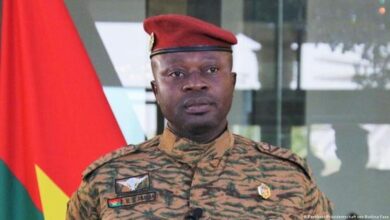
Burkina Faso’s Soldiers Ousts Military Leader Damiba, Dissolves Government
Burkina Faso’s military leaders on Friday announced they had ousted military leader Paul-Henri Damiba, dissolved the government and suspended the…
Read More » -
Burkina Faso
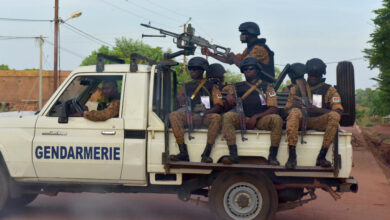
Burkina Faso’s Government: 11 Soldiers Killed, Dozens Missing After Convoy Attack
Burkina Faso’s government on Tuesday said at least 11 soldiers have been killed and 50 civilians were missing after unidentified…
Read More » -
Burkina Faso
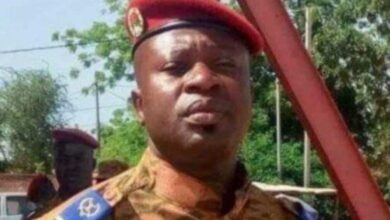
Burkina Faso’s Military Leader Damiba Takes Over Defence Portfolio In Cabinet Reshuffle
Burkina Faso’s leader Colonel Paul-Henri Damiba has sacked his defence minister and taken over the defence portfolio himself, a statement…
Read More » -
Burkina Faso

Burkina Faso’s Army Admits Accidentally Killing Civilians During Military Strike
Burkina Faso’s army on Wednesday admitted to have accidentally killed civilians during a military operation in the country’s southeast earlier…
Read More » -
Burkina Faso
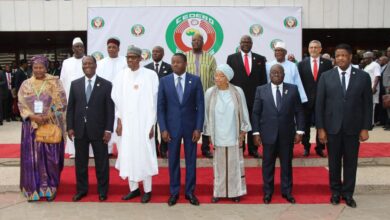
Leaders Of ECOWAS Lifts Economic, Financial Sanctions Imposed On Coup-Hit Mali
Leaders of the Economic Community of West African States (ECOWAS) on Sunday lifted economic and financial sanctions imposed on Mali,…
Read More » -
Burkina Faso

Burkina Faso’s Military Gives Two Weeks’ Time To Evacuate Before Army Operation
Burkina Faso’s army on Friday said it has given two weeks’ time to the civilians to evacuate vast areas in…
Read More » -
Burkina Faso

Burkina Faso’s Army Orders Civilians To Evacuate Two Vast Military Zones
Burkina Faso’s military has ordered civilians to evacuate two large military interest zones in its northern and southeastern regions ahead…
Read More » -
Burkina Faso
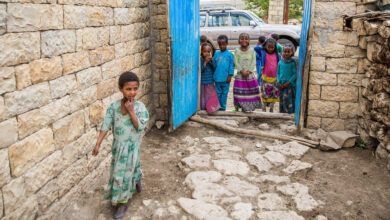
UNHCR Appeals Urgent Support For Refugees After Deadly Burkina Faso Attack
The UN refugee agency (UNHCR) on Friday appealed for urgent support for about 16,000 people in Burkina Faso, after attacks…
Read More » -
Burkina Faso
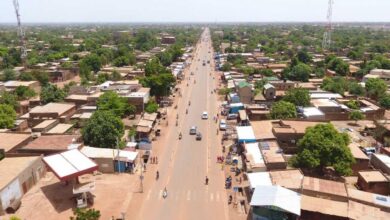
Burkina Faso’s Government Says Over 50 Killed By Militants In Latest Attack
Burkina Faso’s government spokesman, Lionel Bilgo, on Monday informed at least 55 civilians lost their lives in an attack by…
Read More » -
Burkina Faso
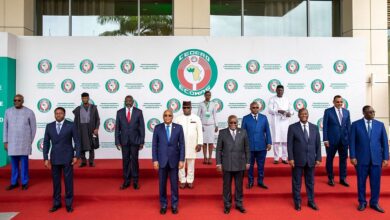
West African Leaders Decide To Continue Sanctions On Mali For Now
West African leaders on Sunday said they have decided to maintain sanctions on Mali for now but they could lift…
Read More » -
Burkina Faso

Burkina Faso: At Least 50 People Killed In Jihadist Attack On Eastern Rural Village
At least 50 civilians have been killed in a militant attack in eastern Burkina Faso on Wednesday, the region’s governor…
Read More » -
Burkina Faso
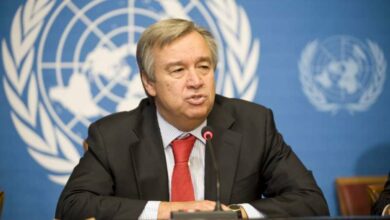
UN Chief Urges Burkina Faso, Guinea, Mali’s Juntas To Hand Power Back To Civilians
The United Nations (UN) Secretary-General Antonio Guterres on Sunday made an appeal to Burkina Faso, Guinea, and Mali’s military junta…
Read More » -
Burkina Faso

Burkina Faso’s Interim President Says Security Situation Will Dictate Transition Timeline
Burkina Faso’s interim president, Paul-Henri Damiba, on Friday said the government’s 36-month transition timeline to democracy could be revised if…
Read More » -
Burkina Faso

Burkina Faso’s Military Junta Says Its Priority Is To Restore Security In The Country
Burkina Faso’s military junta on Thursday said its priority was to restore security in the country before handing it over…
Read More » -
Burkina Faso

ECOWAS Bloc To Continue Supporting Burkina Faso Despite Military Coup
The Economic Community of West African States (ECOWAS) will continue to support Burkina Faso despite concerns about the ruling military…
Read More » -
Burkina Faso

Burkina Faso’s Interim President Damiba Approves New Government
Burkina Faso’s new head of state Paul-Henri Sandaogo Damiba on Saturday approved a new government that will lead the country…
Read More » -
Burkina Faso

Burkina Faso’s Military Leader Damiba Gets Sworn In As Country’s New President
Burkina Faso’s military leader Lieutenant-Colonel Paul-Henri Sandaogo Damiba was sworn in as the country’s new president on Wednesday, just over…
Read More » -
Burkina Faso

Burkina Faso’s Constitutional Council Appoints Coup Leader Damiba As New President
Burkina Faso’s Constitutional Council on Thursday appointed Lt. Col. Paul Henri Sandaogo Damiba, the military leader who staged a coup…
Read More » -
Burkina Faso

ECOWAS Leaders Says Burkina Faso Military Willing To Restore Constitutional Order
The Economic Community of West African States (ECOWAS) leaders on Thursday said the military government in the coup-hit Burkina Faso…
Read More » -
Burkina Faso

Burkina Faso’s Military Junta Lifts Nationwide Curfew In Force Since Last Month’s Coup
Burkina Faso’s military junta on Wednesday lifted a nationwide curfew that was imposed after last month’s coup, reported France 24.…
Read More » -
Burkina Faso

Burkina Faso’s Military Restores Constitution, Names Coup Leader As New President
Burkina Faso’s military junta on Monday announced it has restored the country’s constitution and appointed the coup’s leader as head…
Read More » -
Burkina Faso

ECOWAS Suspends Burkina Faso Amid A Military Takeover, Calls For Release Of Kabore
The Economic Community of West African States (ECOWAS) on Friday suspended Burkina Faso following a recent military coup, reported Reuters.…
Read More » -
Burkina Faso

Burkina Faso’s Military Leader Damiba Promises Return Of Constitutional Order
Burkina Faso’s military leader Lieutenant Colonel Paul-Henri Damiba on Thursday said that the country will return to constitutional order when…
Read More » -
Burkina Faso

ECOWAS Calls For An Extraordinary Summit To Examine Situation In Coup-Hit Burkina Faso
The Economic Community of West African States (ECOWAS) on Tuesday called for an extraordinary summit to examine the situation in…
Read More » -
Burkina Faso
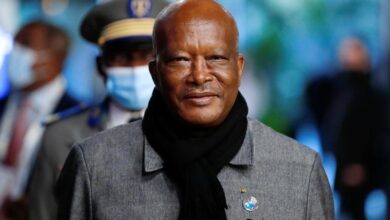
Burkina Faso’s Mutinous Military Seizes Power, Dethrones President Roch Kabore
Burkina Faso’s military on Monday declared says it has seized power, ousted President Roch Kaboré, and dissolved the country’s government…
Read More »

